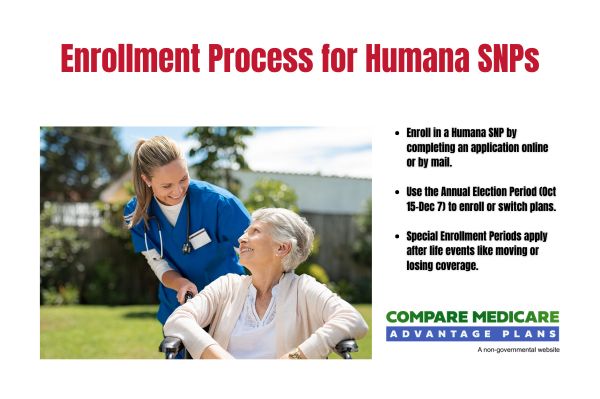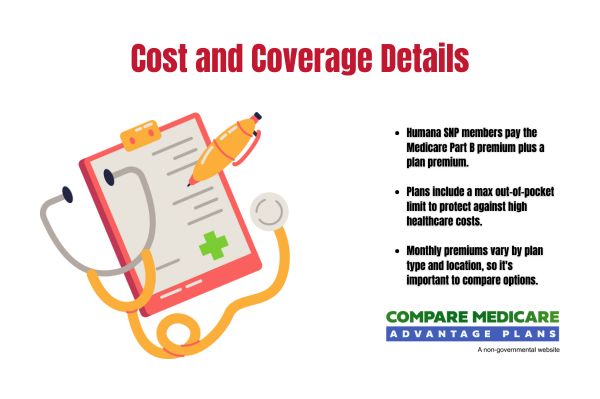




Humana Special Needs Plan
Humana Special Needs Plans (SNPs) are Medicare Advantage Plans for people with chronic conditions or those who qualify for both Medicare and Medicaid. Learn about the eligibility requirements, plan types, and potential benefits in this article.
Key Takeaways
- Humana Special Needs Plans (SNPs) are specialized Medicare Advantage offerings designed for individuals with chronic conditions, focusing on tailored benefits.
- Eligibility for Humana SNPs varies by type, including Chronic Condition SNPs, Dual-Eligible SNPs for those qualifying for Medicaid and Medicare, and Institutional SNPs for individuals in long-term care facilities.
- The enrollment process for Humana SNPs is straightforward; important enrollment periods include the Annual Election Period (AEP) and Special Enrollment Periods (SEPs) for qualifying life events.
Compare Plans in One Step!
Enter Zip Code
Understanding Humana Special Needs Plans

Humana Special Needs Plans (SNPs) will likely be specifically designed to cater to individuals with severe or chronic conditions, possibly offering a range of benefits and services that could be tailored to their unique healthcare needs. These plans are part of Humana’s Medicare Advantage potential offerings and can be categorized into either Health Maintenance Organization (HMO) or Preferred Provider Organization (PPO) types. Humana follows a Medicare contract to ensure these plans comply with federal regulations, offering necessary protections and benefits to enrollees.
Humana has been committed to upholding federal civil rights laws, ensuring no discrimination based on race, age, sex, disability, military or veteran status, or religion. This compliance likely ensures that all Humana SNP members receive equitable and fair treatment, enhancing their overall healthcare experience.
Let’s explore the different types of Humana SNPs and their eligibility criteria.
Types of Humana SNPs
Humana will likely offer three main types of Special Needs Plans to cater to diverse healthcare needs. Chronic Condition SNPs (C-SNPs) are designed for individuals with specific chronic diseases, possibly providing targeted care and support.
Dual-Eligible SNPs (D-SNPs) might serve those who qualify for both Medicare and Medicaid, offering a coordinated approach to manage their healthcare needs. Lastly, Institutional SNPs (I-SNPs) will likely be tailored for beneficiaries living in institutions like nursing homes, possibly ensuring they receive comprehensive care in their living environment.
Each SNP type will likely be designed to address the unique challenges of its members, possibly enhancing their overall health and well-being.
Eligibility Criteria for Humana SNPs
Eligibility for Humana SNPs might vary depending on the specific plan type. For Chronic Condition SNPs (C-SNPs), individuals must have a diagnosis of a specific chronic condition. Dual-Eligible SNPs (D-SNPs) require members to be eligible for both Medicare and Medicaid support.
Institutional SNPs (I-SNPs) are available to individuals residing in long-term care facilities, likely catering to those with complex health needs. These criteria help ensure members receive the most suitable and effective care for their specific health conditions.
Possible Benefits of Humana Special Needs Plans

Humana Special Needs Plans (SNPs) will likely be designed to meet the healthcare needs of individuals with chronic conditions or disabilities. These plans may provide tailored benefits and services, such as care coordination, additional Medicare benefits, and sometimes prescription drug coverage, likely aimed at enhancing the overall health and wellness of their members. These comprehensive services could provide the support members need to manage their health effectively.
Additional Medicare Benefits
Some Humana Medicare SNPs might go beyond standard Medicare offerings by providing additional benefits such as vision, hearing, and dental coverage, which are typically not included in standard Medicare plans. Members may receive coverage for routine vision and dental care, possibly enhancing their overall health and quality of life.
Prescription Services Delivered
Prescription drug coverage will likely be a crucial component of Humana SNPs, potentially ensuring that members could have access to necessary medications at reduced costs. Some Humana SNPs may offer comprehensive prescription drug coverage, likely making it easier for members to receive their medications.
Enrollment Process for Humana SNPs

Enrolling in a Humana Special Needs Plan (SNP) can be done though this website or by phone. This process is designed to be straightforward and accessible, ensuring that individuals can easily apply for the plan that best suits their healthcare needs.
Knowing the important enrollment periods is crucial for securing the appropriate health coverage. The Annual Election Period (AEP) runs from October 15 to December 7 each year, allowing individuals to enroll or switch Medicare plans.
Special Enrollment Periods (SEPs) are available for those who experience qualifying life events, such as moving or losing other health coverage. Awareness of these enrollment options helps individuals secure the coverage they need when they need it most.
Important Enrollment Periods
The Annual Election Period (AEP) is a critical time for enrolling in a Humana SNP, running from October 15 to December 7 each year. This period allows individuals to enroll in or switch Medicare plans, securing necessary coverage for the upcoming year.
Special Enrollment Periods (SEPs) are also available for those who experience qualifying life events, such as moving or losing other health coverage. These options offer flexibility, helping individuals secure appropriate health coverage based on their circumstances.
How to Apply
Applying for a Humana SNP is a straightforward process that can be completed by using this website or by calling one of our licensed agents at 1-833-641-4938 (TTY 711), Mon-Fri 8 am-9 pm EST.
This flexibility allows individuals to choose the most convenient application method, making healthcare coverage more accessible.
Cost and Coverage Details

Understanding the potential costs and coverage details of Humana Special Needs Plans (SNPs) will likely be essential for making informed decisions about healthcare. Members typically need to pay their Medicare Part B premium in addition to the Humana plan premium. However, Humana SNPs might have a maximum out-of-pocket limit, which could help to protect members from high healthcare costs. This balance of premiums and out-of-pocket limits could potentially ensure that members can manage their healthcare expenses effectively.
Monthly premiums for Humana SNPs might vary based on the specific plan and location. These premiums will likely be determined by the type of plan selected and the geographic area where the member resides. Understanding these variations is crucial for budgeting and selecting the most appropriate plan for individual healthcare needs.
Appropriate Cost Sharing Amounts
Members of Humana SNPs will likely have specific copayment and coinsurance amounts for various services, which might depend on their plan:
- Copayment structures may differ by service type, with fixed amounts for certain services.
- Coinsurance rates may vary.
- Members may encounter different coinsurance rates depending on whether they use in-network or out-of-network providers.
Understanding these costs coverage and benefits details will likely be essential for managing healthcare expenses effectively.
Provider Networks and Pharmacy Options
Humana’s network of healthcare providers and pharmacies will like be designed to meet the diverse needs of SNP members. This network might include:
- A variety of healthcare providers and pharmacies, varying by location
- Access to a comprehensive support system that includes primary care providers, specialists, and pharmacies
- Assurance that members receive the care they need wherever they are
Humana’s diverse range of providers could potentially ensure members can find the right healthcare professionals and services to meet their needs.
Humana SNP members can easily choose a primary care provider from the network by using the Plan Finder Tool on this website or by calling one of our licensed agents. This flexibility allows members to select a provider who best suits their healthcare needs, possibly ensuring they receive personalized and effective care.
Primary Care Provider and Specialists
Members can choose their primary care provider from Humana’s extensive network by using the Plan Finder Tool on this website. This process ensures that members can select a healthcare provider who best meets their needs, providing personalized and comprehensive care.
Access to a wide range of specialists and other ancillary providers may further enhance the healthcare experience for Humana SNP members.
Preferred Cost Share Pharmacies
Preferred pharmacies affiliated with Humana may offer lower prescription costs and sometimes provide additional services not available at standard pharmacies. These preferred pharmacies will likely be located in urban areas, suburban, and rural areas across various states, possibly ensuring that members have access to affordable medications wherever they are.
Customer Service and Support
Humana provides a dedicated customer service line to assist members with inquiries and support related to their plans. Members can:
- Reach the customer service number at 1-800-281-6918 for assistance with plan-related inquiries.
- Get help from the customer care team to navigate their benefits.
- Receive support to resolve issues.
- Ensure they receive the support they need.
This dedicated support system helps members manage their Humana SNPs effectively and with confidence.
Legal and Regulatory Compliance
Humana Special Needs Plans (SNPs) operate under a contract with Medicare, ensuring that they meet federal requirements and standards. This contract requires annual renewal to maintain compliance and continue offering these plans to members. The renewal process involves a reassessment of the contract with Medicare, ensuring that Humana SNPs adhere to updated federal guidelines and provide the necessary protections and benefits to enrollees.
Possible updates may change coverage parameters and could affect how Humana SNPs conform to federal regulations. Being informed about these updates is crucial for understanding their impact on coverage and compliance.
Medicare Contract and Renewal
Humana maintains a contract with Medicare, which is crucial for offering its Special Needs Plans (SNPs). This contract requires annual renewal and likely involves:
- A thorough review of the contract terms
- Ensuring compliance with updated federal guidelines and standards
- Confirming continued eligibility to provide these essential services
This rigorous process likely ensures Humana SNPs continue to offer high-quality care and benefits to their members.
Summary
Humana Special Needs Plans (SNPs) will likely offer a comprehensive and tailored approach to healthcare for individuals with chronic conditions or disabilities. With a variety of plan types, including Chronic Condition SNPs, Dual-Eligible SNPs, and Institutional SNPs, Humana could potentially ensure that members receive the specific care they need. The potential incorporation of additional Medicare benefits, prescription drug coverage, and a robust network of healthcare providers and pharmacies, Humana SNPs could enhance the overall healthcare experience.
Understanding the enrollment process, cost details, and legal compliance further empowers members to make informed decisions about their healthcare. By leveraging these benefits and resources, Humana SNP members can achieve better health outcomes and enjoy a higher quality of life.
Frequently Asked Questions
→ What are the types of Humana Special Needs Plans (SNPs)?
Humana provides three distinct types of Special Needs Plans (SNPs): Chronic Condition SNPs (C-SNPs) for individuals with specific chronic illnesses, Dual-Eligible SNPs (D-SNPs) for those eligible for both Medicare and Medicaid, and Institutional SNPs (I-SNPs) for beneficiaries in institutional settings such as nursing homes.
→ How can I apply for a Humana SNP?
To enroll for a Humana SNP, you can use this website or call one of our licensed agents at 1-833-641-4938 (TTY 711), Mon-Fri 8 am-9 pm EST.
→ What additional benefits do Humana SNPs offer?
Some Humana SNPs may offer added benefits like vision, hearing, and dental coverage, as well as prescription drug coverage, possibly enhancing your healthcare experience beyond standard Medicare options.
→ What are the potential costs associated with Humana SNPs?
Humana SNPs generally require members to pay their Medicare Part B premium along with the plan premium, which may vary based on the specific plan and location. It’s essential to review the details of your plan for exact costs.
→ How do Humana SNPs ensure compliance with federal regulations?
Humana SNPs ensure compliance with federal regulations by operating under a Medicare contract that requires annual renewal, which incorporates updated guidelines and standards, including recent legislative changes. This structured approach helps maintain adherence to the evolving regulatory environment.

ZRN Health & Financial Services, LLC, a Texas limited liability company


